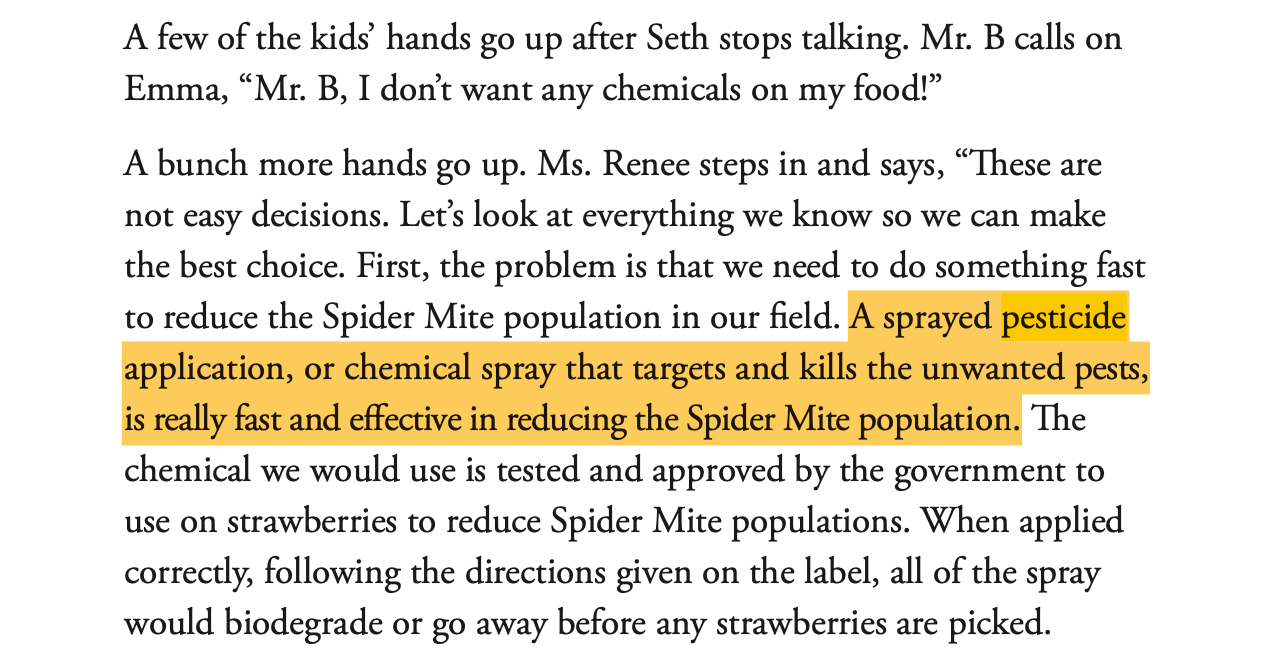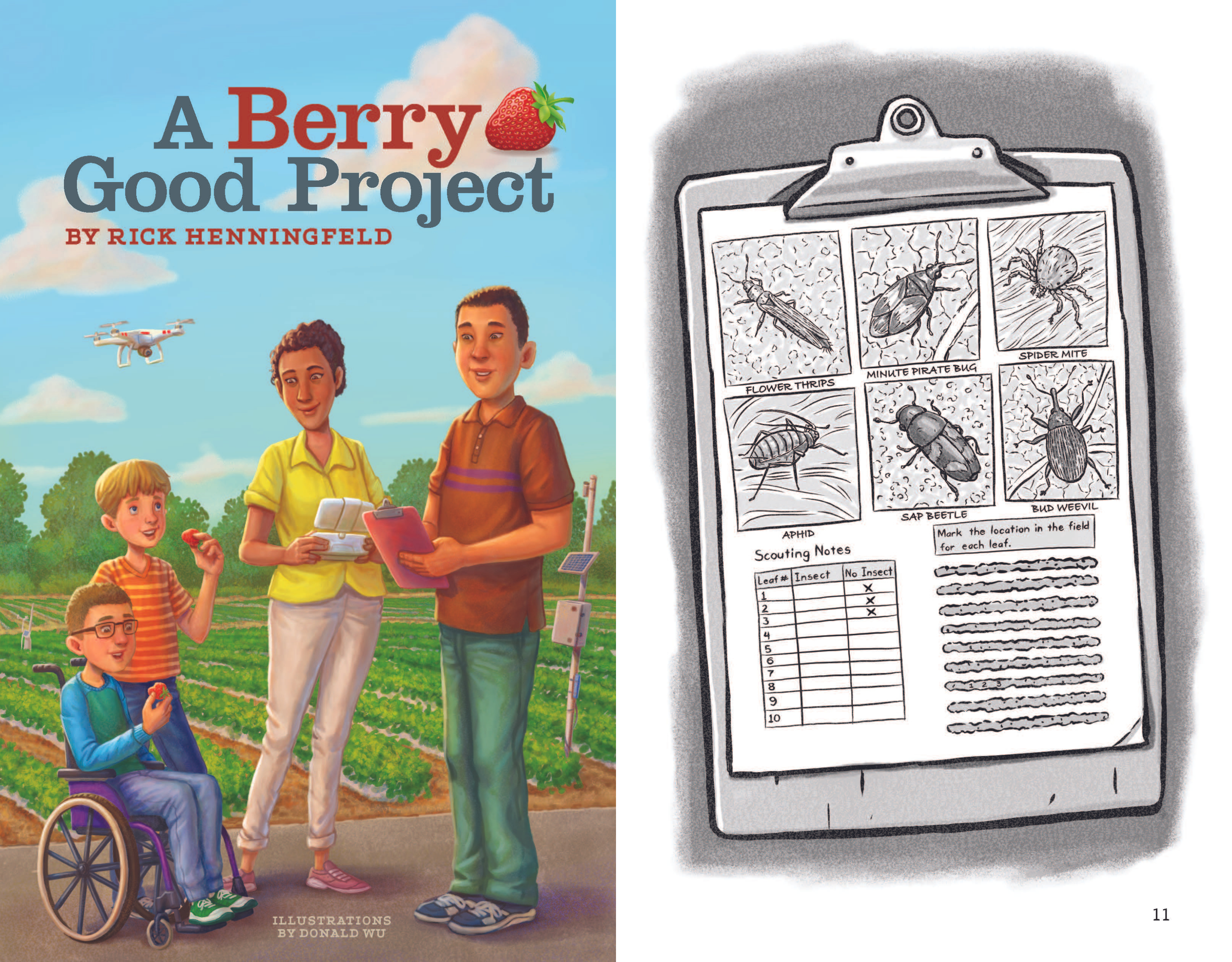Big Agriculture Is Printing Children’s Books That Say Pesticides Are Great
The opening pages of A Berry Good Project have the feel of a typical children’s book. There’s an earnest fourth grader named Rowan who loves strawberries, a science teacher that the kids affectionately refer to as Mr. B., and an upcoming class project shrouded in mystery.
But things get a bit weird when the fourth grade class visits a local strawberry field and learns that spider mites are threatening the berries. An agriculture expert named Ms. Renee tells the children the problem can be easily fixed with “a chemical spray that targets and kills the unwanted pests.”
After one of the kids protests that she doesn’t want chemicals in her food, the book’s grown-ups assure her that experts like Ms. Renee know what they’re doing and we should “follow the instructions they give.”
A Berry Good Project was created by Feeding Minds Press, whose target demographic is grade-schoolers and kindergarteners. Its books have whimsical titles, colorful illustrations, relatable protagonists—and storylines that extoll the benefits of pesticides and nitrogen fertilizers.
Feeding Minds Press is a project of the American Farm Bureau Foundation. Starting in 2019, it’s been publishing children’s books that “strive to offer completely accurate information about agriculture.” These books typically come with study guides that are made available to schoolteachers, an attempt to counter the anti-factory farm “propaganda” that kids are allegedly exposed to in school, a Farm Bureau Foundation article explains.
But the Farm Bureau Foundation is not a neutral player when it comes to these debates.
The foundation is the education arm of a powerful lobby group known as the American Farm Bureau Federation. The sprawling industrial farming operations represented by the Farm Bureau are one of the biggest polluters of freshwater in the U.S., and a major source of methane and nitrous oxide, two highly potent greenhouse gases. The organization’s executive director, Zippy Duvall, participated in Donald Trump’s inauguration parade wearing a “Make America Great Again” hat. “It’s an exciting day in America,” he said at the time.
Since then, the outlet Roll Call reports, “Trump enjoyed a close relationship with farmers. He spoke to thousands of cheering members of the Farm Bureau at the organization’s annual January convention in 2018, 2019, and 2020.”
As recently as three years ago, the Farm Bureau was officially questioning if humans are causing the climate to warm (it’s now partnering with corporate-friendly environmental groups and calling for “voluntary” industry-led climate solutions). The Farm Bureau is currently fighting with “energy and passion” an attempt by the Biden administration to bring in tougher regulations keeping pollution out of streams, rivers, lakes, and oceans. Meanwhile, Americans say they’re eating less meat than ever, the market for plant-based meat alternatives is growing, and support for organic farming practices is steadily rising.

At a time when the environmentally destructive factory farm model is being scrutinized and threatened like never before, Feeding Minds Press is trying to instill in minds that haven’t been fully formed “a positive portrayal of agriculture and producers.”
The organization insists its books have a high educational value. “EPA-approved pesticides and fertilizers are used on modern organic and conventional farms. Our books explain that pesticides and fertilizers are used and why they are used in a way that is understandable to young readers,” Daniel Meloy, executive director of the Farm Bureau Foundation, wrote in an email to VICE News.
While some of the books can be downloaded for free on the Feeding Minds website, it’s unclear how many of them are actually ending up in classrooms. When asked, Meloy replied that “orders for our books are handled by our distributor and often placed through companies so it’s difficult to answer your question.” YouTube videos promoting new titles have dismally low views. But some environmental experts find the mere existence of the books disturbing.
“It’s obviously nefarious,” Jennifer Jacquet, an associate professor of environmental studies at New York University, told VICE News. “If you want to spread propaganda, starting with what we tell our children is a very good place to begin.”
The books are designed to be as relatable as possible to kids. In A Berry Good Project, the narrator Rowan explains, “The reason I’m so excited for this class project is because my two brothers, Jack and Kane, guaranteed me that I would get to eat all the strawberries I could ever want at the end of the project, and I L.O.V.E. strawberries.”
The spider mite invasion is presented as an existential threat to the students: “Sophia says quietly, ‘No strawberries would mean no strawberry sundae fundraiser!’”
But luckily, Ms. Renee is there to explain that they can fix the problem with pesticides. Even then, some kids are skeptical. “I don’t want any chemicals on my food!” one says.
Ms. Renee assures the class that it’s the best option, saying pesticides are “really fast and effective in reducing the Spider Mite population. The chemical we would use is tested and approved by the government.”
A local strawberry farmer, Mr. Bower, tells the kids not to question her wisdom. “I look at Ms. Renee’s recommendations similar to a doctor giving a prescription. They are both experts and, as long as we follow the instructions they give, like when I give my kids medicine, we can ensure everything will be safe and healthy,” he says.
Feeding Minds Press says it is promoting a positive message. “We hope that our books cultivate curiosity in agriculture. Ultimately it would be wonderful if our young readers went on to pursue careers in agricultural science so that they can create new innovations in farming that benefit everyone and the environment,” Malone said.

Yet A Berry Good Project doesn’t once mention the vast environmental impacts of industrial pesticides. An academic study last year found that “pesticides widely used in American agriculture pose a grave threat to organisms that are critical to healthy soil, biodiversity, and soil carbon sequestration to fight climate change,” explains a summary from the Center for Biological Diversity.
It’s no mystery why Feeding Minds Press is trying to downplay those impacts to children. “The Farm Bureau is an arm of the agrochemical industry; they work hand in hand,” Jay Feldman, executive director of the advocacy group Beyond Pesticides, told VICE News. “There are tremendous financial interests that are dependent on the chemicals used in agriculture.”
A Berry Good Project is officially endorsed by one of those interests. The book’s “title sponsor” is Nichino America Inc., a U.S. subsidiary of Nihon Nohyaku Co, an agrochemical firm based in Japan with nearly $680 million in sales last year.
“Nichino America sponsored the book because we believe agricultural literacy is more important today than ever,” a spokesperson told VICE News. “Teaching children about where food comes from, and how they can have a role in the agricultural process, helps them understand that food doesn’t magically appear on the grocery store shelves and that our farms should be protected.”
Other titles actively promote the nitrogen fertilizer industry. In The Prized Pumpkin, a children’s book Feeding Minds published in 2020, a young girl named Tori and her friend Jade compete to see who can grow the best pumpkin. But soon they run into problems. Some of the leaves on the pumpkin plant are turning yellow. Tori’s dad invites his friend Ms. Amy, an agronomist, to give advice.
“‘Hmm, yeah, those are yellow leaves, alright. Let’s see if we can figure out why,’” Ms. Amy says. “‘Your plants are running low on a specific nutrient called nitrogen. You’re going to want to give the plants a fertilizer with more nitrogen, or your plants will stop growing. Just like
you, the plants need nutrients, or food, to grow!’”
After Ms. Amy’s input, “Dad helped us fertilize the plants with nitrogen,” Tori explains. “Thankfully, it WORKED! After a week, our leaves were looking a lot less hungry.”
This is a quaint portrayal of a fertilizer manufacturing industry whose current U.S. market is estimated by IBIS World to be $19.5 billion. One of the biggest players is Koch Industries, the industrial behemoth run by billionaire Charles Koch, whose fertilizer division has nearly $475 million in annual sales. (Koch Industries isn’t affiliated with The Prized Pumpkin.)
But those profits come with a huge environmental impact. Excess use of nitrogen fertilizer on farms can enter water supplies, where it can cause algae blooms that kill off fish and other aquatic species, while at the same time producing toxins that contaminate drinking water for humans. The Environmental Protection Agency estimates that nitrogen and phosphorus, two common ingredients in fertilizer, together have polluted “more than 100,000 miles of rivers and streams, close to 2.5 million acres of lakes, reservoirs, and ponds, and more than 800 square miles of bays and estuaries in the United States.”
Nitrogen fertilizer also causes the release of nitrous oxide, a greenhouse gas almost 300 times more potent than carbon dioxide. The majority of these nitrous oxide emissions, nearly three-quarters in the U.S., come from agriculture, according to the U.S. Energy Information Administration. So do 36 percent of the country’s methane emissions.
“Even though methane gets a lot more attention, nitrous oxide is on equal footing,” said David Kanter, vice chair of a research program called the International Nitrogen Initiative and an assistant professor at NYU. “It’s one of the most significant environmental problems that agriculture contributes to.”
Jacquet, the environmental studies professor, read through The Prized Pumpkin and said she was “astonished” when she came to the section praising nitrogen fertilizer. “You have to wonder, is nitrogen such an obvious environmental problem that you have to start your messaging with a 7-year-old?” she said.
But the books have an educational value their creators might not have intended. To Jacquet they reveal the mindset of an industry whose vast environmental footprint is becoming a growing financial liability. “It represents a very defensive position,” she said.
Follow Geoff Dembicki on Twitter.
News
via https://www.DMT.NEWS
Geoff Dembicki, Khareem Sudlow
